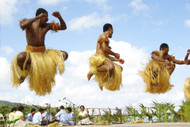Useful things to know about Samoan life and culture before visiting
Posted by Maris on 22nd Sep 2023
One of the best things about visiting Samoa is that traditional culture is not limited to tourist destinations. People continue to emphasize Fa’a Samoa (the Samoan way), a way of life that dates back more than 3000 years and is still represented in most elements of Samoan culture and society today.
Life in Samoa is all about being part of a community that looks after one other, rather than functioning in a nuclear style where people fend for themselves. People in Samoa are very friendly because of their values and collective way of thinking. Samoans do not stay to themselves; they embrace newcomers with their distinctive grins and open arms.
Samoa offers a wide range of unique activities that allow tourists to explore and comprehend Samoan culture, whether it’s dancing and music, cooking, art and craft, a village visit, or an ava ceremony.
Have a good time dancing the night away.

There are numerous options to see or perhaps participate in a dance performance. Many resorts and hotels organize weekly fiafia nights, including dance and traditional cuisine. Dance performances are also available at Samoa’s Cultural Village in Apia.
The magnificent dances of Samoa are distinct from those of other Polynesian tribes. The siva is a lovely storytelling dance done by a young woman that is slow and fluid. On the other end of the scale, men in traditional lavalava and ladies in puletasi do the rapid and frenetic fa’ataupati. Siva afi is a stunning fire knife dance in which young boys or men swirl a big knife with burning flames around their body to the rhythm of a wooden drum. It all adds up to an impressive viewing experience.
Feed your passion for sports and fitness.

Samoans are big fans of sports and fitness, especially rugby union and league, soccer, netball, village volleyball, and Kilikiti (a Polynesian cricket variant popular in villages). Apia, Samoa’s capital city, features diverse sporting facilities, many of which were created or renovated for the 2007 and 2019 South Pacific Games, including the Apia Park National Stadium.
Apart from rugby grounds and cricket ovals, Samoa has golf courses, tennis courts, beach volleyball courts, and gyms. You could also request to join a casual local Kilikiti match.
Learn the local jargon.
Samoan is the national language of Samoa. Many younger Samoans speak English, but fluent English is uncommon outside of Apia and Samoa’s principal resorts. If you want to visit smaller, distant communities and islands, acquiring a few basic Samoan words and phrases is a good idea. The attempt to learn the language also demonstrates respect, which the people would appreciate.
Listen to our stories, Tala faasolo.

Knowing Samoa means hearing its stories. According to mythology and history, Samoans descended from the gods and heavens to inhabit these tropical Pacific islands. Many of Samoa’s historic legends are transmitted through dances and music, as well as through art, crafts, and traditional tattoos. They are also told through the artifacts on display in Samoa’s museums and at numerous noteworthy archaeological sites open to the public.
Other stories from Samoa are from more recent historical events that changed the country into what it is now. This encompasses Samoa’s ties with neighboring Polynesian islands, European arrival, the civil war that separated Western Samoa from American Samoa, a devastating outbreak of Spanish influenza, and the events that led to independence from Germany, then New Zealand.
Religion and the Church’s Importance

The church is essential to Samoan culture. Missionaries brought Christianity to the islands in 1830, and the Christian faith blended with Samoans’ beliefs in gods of the sun, earth, heavens, and sea.
Most Samoans today identify as Christian and attend church at least once a week. Sundays are designated as National Days of Rest. While many tourist attractions are available, visitors are asked to be respectful and to travel gently through the communities. If you stay in a family-run establishment, you may discover that your hosts do not provide a cooked breakfast on Sundays.
On Sunday, women should wear a dress or blouse and skirt to church, while males should wear pants and a shirt. Samoans practice a mandatory evening prayer restriction known as Sa, or sacred, in select areas between 6-7pm. Sa is signaled by a bell or conch shell blowing, lasting 10 to 20 minutes, ending with a third bell.
Sacred ink: how tattoos tell the Samoan story

Samoan Tatau (tattoos) are part of a thousands-year-old heritage. Tatau are like treasures that empower the wearer daily and show that respect has been earned. Samoans are extremely proud of their tattoos since they are a wonderful aspect of their traditional culture.
In contrast to Western society, where tattoos are typically regarded as a personal fashion choice, getting a tattoo to commemorate an individual milestone or the loss of a loved one is generally considered a rite of passage and a sign of inner strength and fortitude.
Malofie is the name given to a traditional male tattoo. Its dense design spans the entire lower torso from the waist to the knee. A young guy who has it done is not only regarded as a complete member of the aumaga (untitled men), but he is also permitted to serve the matai (chiefs).
Malu – a less thick form of Malofie that goes from the upper thigh to the back of the knee. It demonstrates to women that they are ready and mature to assume responsibilities in the household and community.


